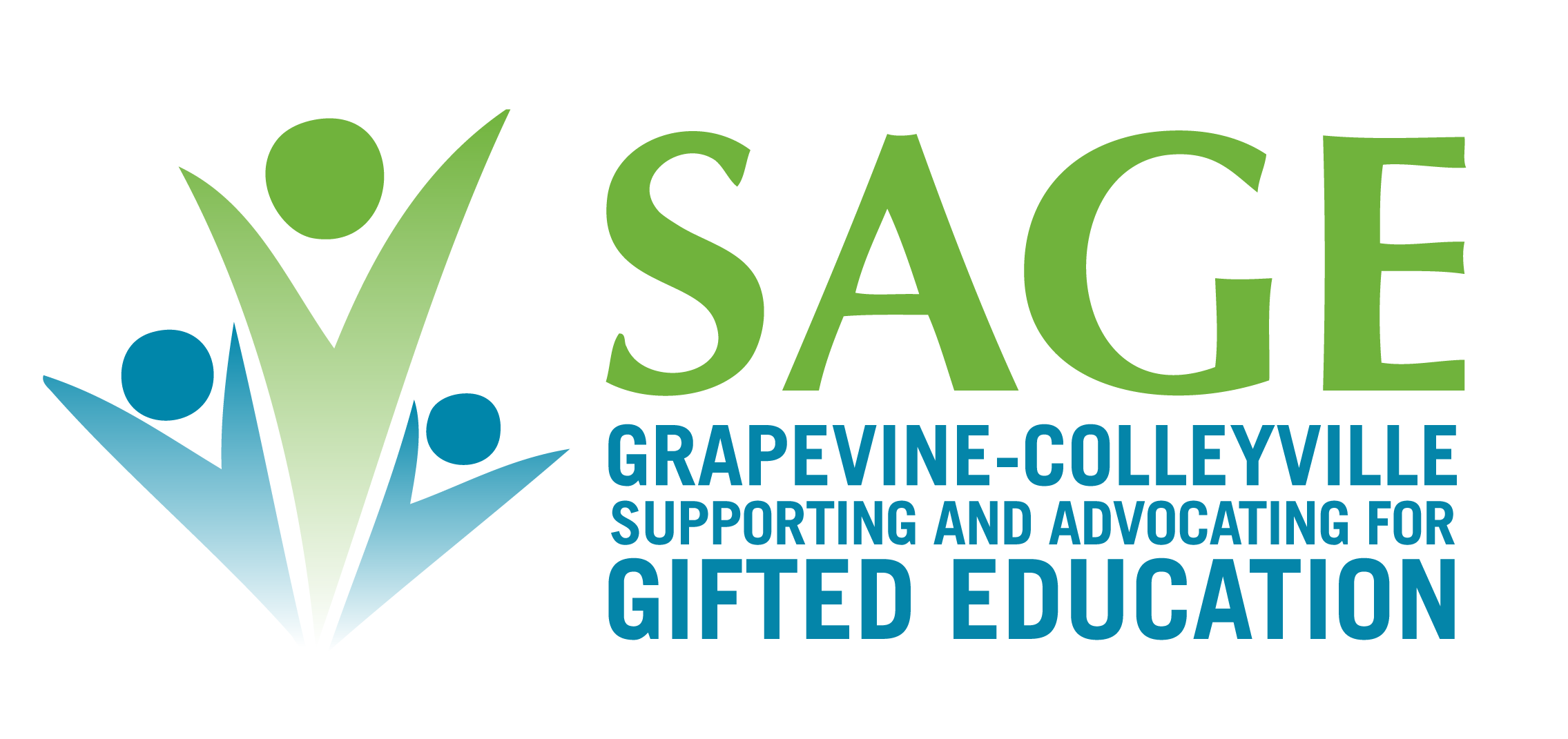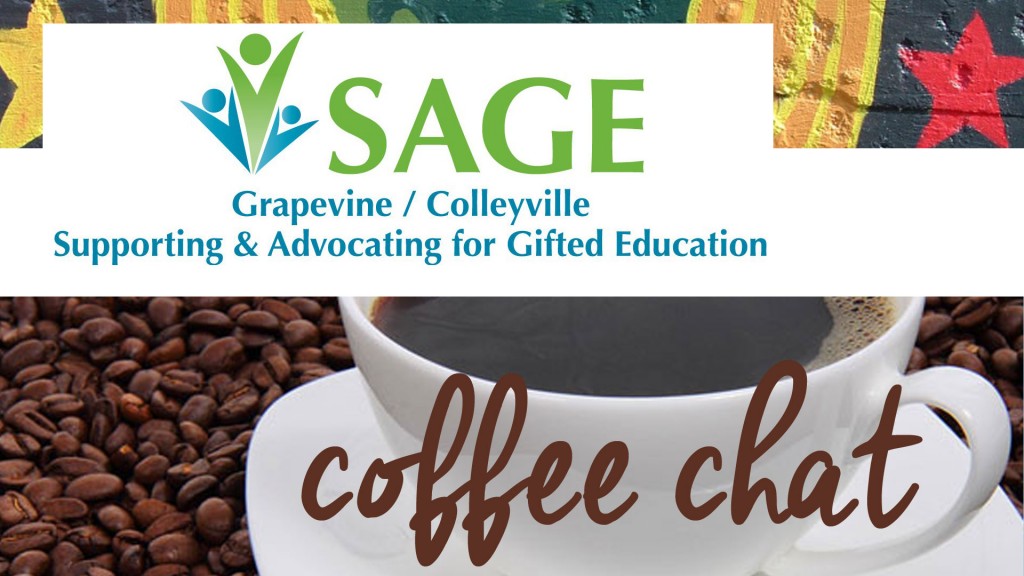On Wednesday, Feb. 17, 2016, from 8:30 to 10 a.m., SAGE hosted a Coffee Chat with special speaker Emberly Hill, GCISD Director of Counseling.
Recap:
Counseling Director Emberly Hill, along with counselors or administrators from each high school and middle school, participated in the panel: CTMS Principal Lisa Dunn, GHS Counselor Mariella Alvarado, CMS Counselor Krystal McCure, GMS Counselor Marilyn Johnson, CHHS Counselor Stephanie Cook, and HMS Counselor Marsha Fields.
The following is a summary of today’s presentation and Q&A:
1) Ivy League university visit summary
Mariella Alvarado reported on three counselors’ recent tour of three Ivy League universities at which they talked to admissions officers:
Harvard (Boston, Massachusetts): “Head, heart, gut.” Admissions will look at student’s transcript and will accept “growth” in a class. Want students who have a deep interest of going further in the field. Scholarships based on need.
MIT (Boston): “Mensa, Manos” (head and hands). Can take classes @ Harvard and vice versa. Core math and science curriculum. Emphasis on student collaboration to breed innovation. Global travel and learning. MIT Class “wheelchair design for developing countries”
Brown (Providence, Rhode Island): Open curriculum (students declare their concentration as they experience and preview various courses; pass/fail options for internal transcripts). Study abroad promoted in junior year. Close collaboration with Rhode Island School of Design.
Note: A summary of this presentation will be available in the future; stay tuned.
2) Counseling update
From Department of Counseling Director Emberly Hill:
At high school campuses: Students may use an electronic sign in to see counselor for non-emergency reasons. Students sign up to be in an online queue and they can return to class, and counselor notifies them when available.
Working on campus “alignment” and collaboration.
Working on consistency of advising information given to students at middle schools and high schools.
3) Q&A Session
Audience Question: How do you demonstrate extracurricular “passions” on college transcript?
Counselors’ Answers:
– Ambassadors program helps you keep track of hours
– Give counselor the information about what you are doing off campus so the counselor can include it when they write letter of recommendation
– Ask teachers who know you well to write letters of recommendations
– At the college admissions interview, you have a chance to speak to your passions
– “Endorsements” give you a blueprint to take extra elective coursework in certain areas, so they will be in your transcript (ie., high school medical courses, law courses)
– Regarding non-high school courses (summer, online) that student takes: student should include them on resume and upload it to their online college application
– Great idea is to take summer classes at your intended university: get to know professors and ask them for recommendations
– College interviewer will ask “How do you spend your free time?” to see how eager you are
Audience Question: Are counselors telling the students what universities are looking for?
Counselor answer: We are starting in elementary school. In middle school, we sit with every child and go through their classes. Coming up with ways to have individual meetings with each student. Instead of having meetings about college with juniors, we are going to start having meetings with sophomores. FAFSA meeting will include scholarship information.
Parent comment: At Grapevine High School sophomores had a college meeting; some athletes missed the meeting
Q: At what grade level should students start talking about college?
A: Be in touch with your GT learner early, so they are in an environment where they can flourish; tons of options in our district
Q: In elementary schools, to what extent can counselors work with kids one-on-one with social and emotional needs?
Counselor Answer: At any point the child can let the teacher/parent/counselor know that they want time with their counselor. Parents can partners to let the counselor know the child needs to be checked on; email/call the counselor. Encourage student to open up to their counselor about anything.
Q: Does counseling have enough staff to deal with needs of GT students?
A: We do our best with the staffing conditions that we have; try to be innovative. Please let us know if you see things that need to be addressed.
Q: Can we request neurological testing from GCISD?
Counselor Answer: Talk to your campus counselor who can be your ally in a referral. Special Education department can do limited psychological testing.
Parent answer from audience: I would recommend you get an evaluation from a neuro specialist.
Q: Discussed ADA 2016 requirements for twice-exceptional children (gifted children who have a form of disability)
Counselor Answer: Accommodations during school tests are required for a student who has a 504 or IEP (Individualized Education Plan). Anxiety issues and ADHD can be accommodated by a 504/IEP. Work with campus administrators (assistant principal). Counselors can help you find the path to get your solution.
Q: Pros and cons of having a 504 plan?
A: Cannot see any negative. Some students use plan all through HS and some don’t.
A: You can take use 504 plan in college to self advocate for your accommodation needs
Parent answer: 504 accommodations can be used during tests like Duke TIP, PSAT, etc.; however, you need to have documented historical use of the 504 accommodations to get this approved
Q: How do I find out about course selection?
A: Four-year plan starts with from middle school counselor (you can view it as a 6 year plan, if you are starting to plan in MS) Look online at HS course selection: Arena Scheduling and Program of Studies.
Q: If you have a child who has telescoped in math, often they do not meet grade-level prerequisites in High School. What can they do?
A: The level of class they have taken trumps the grade they are in.
Q: Are there ways to test up to an advanced class if you did not telescope?
A: Credit by exam may be possible; you can take Geometry and Algebra concurrently in 9th
Other comments from the counselors:
In the college application interview, your student can’t feign passion or interest or growth; you child is set apart because of who they are. You can’t fabricate a “voracious desire to learn” at an interview. As parents our responsibility is to foster who they are, and help them find their true passions and learn how to communicate that to others.
Counselors track the students who leave GCISD and go to university and try to help current GCISD students connect with graduates at their preferred university.
“Student Advocates” at 2 high schools and 2 middle schools serve as social workers; they are working on videoing parent information meetings that will be put online; topics like suicide, dating, etc.
Counselors encourage parents to provide feedback to counselors about what is the best way to meet the GT kids’ needs.
ADDITIONAL QUESTIONS ASKED AND ANSWERED
We didn’t have time to get to these questions during the Coffee Chat. The counselors provided these answers afterward:
1. You brought valuable information back from your trip; how did the district pay for this and what can we do to make this happen more often?The Chief Learning Officer’s budget paid for the trip. We will continue to look at ways to do this again next year.2. Does a 504 plan negatively impact your chances for college admittance?No, colleges look at the level of rigor of your coursework, your grades, your GPA, and your SAT, ACT scores to determine admissions. They also look at whether or not you are a well rounded student with interests outside of your academics.3. I’m wondering if weighted GPA really matters, because colleges are going to look at course levels and grades and number of high level courses. All high schools do different weights, so GPA will have to be compared unweighted across the country.GPA does matter for class rank and college admission. Colleges and universities use this information in conjunction with test scores to determine eligibility.4. How does GCISD decide what programs are under counseling vs. health?It depends on whether you are talking about Health class and the curriculum for that course or health concerns and medical conditions. For the Health curriculum, that is determined by TEA and decisions are made by the Curriculum and Instruction division. If you are talking about Health Services, such as nursing, generally mental health issues fall under counseling and physical issues fall under Health Services.Please clarify the question if this doesn’t answer the concern.5. This was a comment from the audience: MIT students can cross register with Wellesley College- one of the best, if not the best, liberal arts college in the US.Thank you for the information

